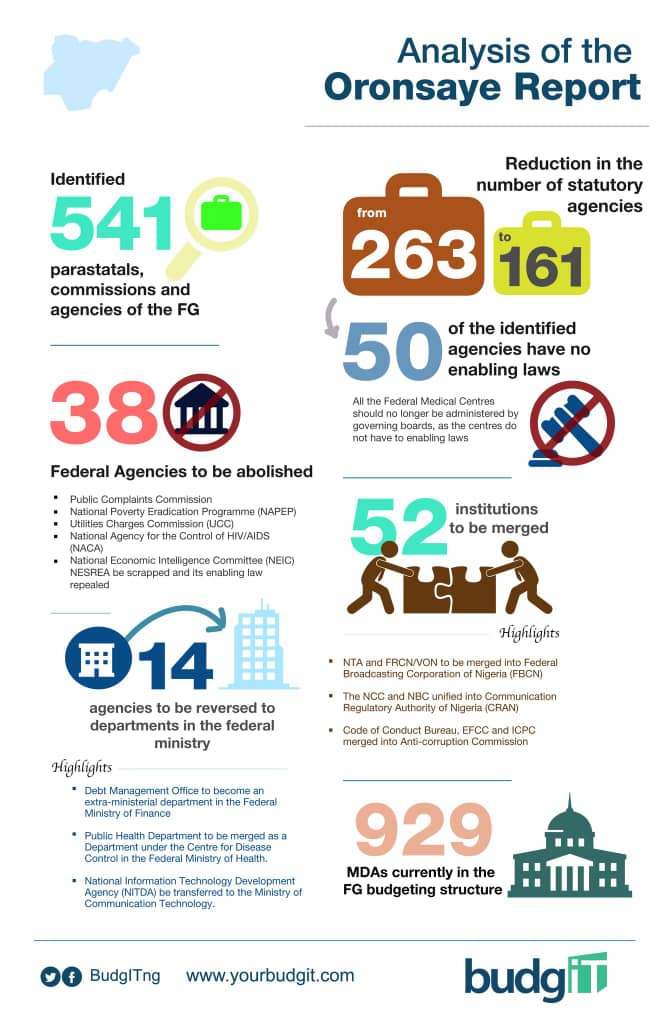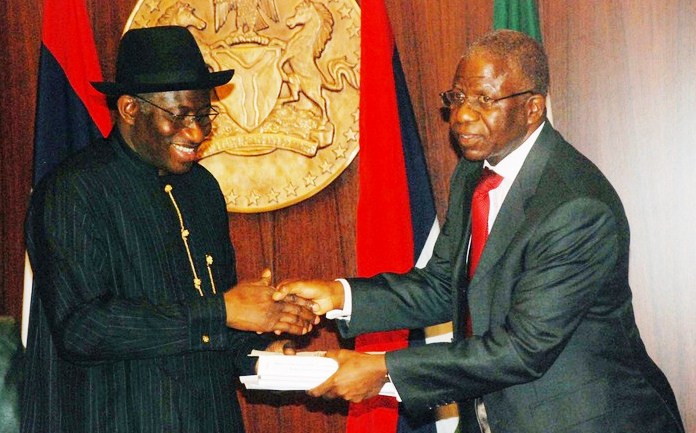[FULL LIST] Reduction of 263 agencies to 161, 38 to be scrapped, 52 to be merged; other highlights of Oronsaye report
The Federal Executive Council meeting presided over on Monday by President Bola Tinubu has announced its decision to implement the Stephen Oronsaye report that called for a leaner government by merging some agencies and scrapping others.
According to a post on X (formerly Twitter) by one of the president’s spokesperson, Bayo Onanuga, the implementation process has already commenced.
“Twelve years after the Steve Oronsaye panel submitted its report on restructuring and rationalizing Federal government parastatals and agencies and a white paper issued two years after, President Tinubu and the Federal Executive Council today decided to implement the report,” Mr Onanuga wrote.
How the Oronsaye report came about

NewsClick Nigeria gathered that former President Goodluck Jonathan in 2011 set up the Presidential Committee on Restructuring and Rationalisation of Federal Government Parastatals, Commissions and Agencies under the chairmanship of Oronsaye.
Oronsaye had a private sector background, from where he joined the civil service at a very high level and rose rapidly to become the Head of the Civil Service of the Federation.
His choice was considered apt with the belief that having come originally from the private sector, he would look at ways of cutting the cost of governing by eliminating wastage through duplicated functions across several government MDAs.
Members of the committee included: Japh CT Nwosu; Rabiu D. Abubakar; Salman Mann; Hamza A. Tahir; Adetunji Adesunkanmi; and Umar Mohammed (Member/Secretary).
The committee submitted an 800-page report on April 16, 2012, in which it uncovered a high level of competition among several overlapping agencies, which not only created ill feelings among government agencies but also brought about unnecessary wastage in expenditure.
It also recommended, among other things, the discontinuation of government funding of professional bodies and councils to free funds for capital projects.
The Oronsaye report established that there are 541 Federal Government parastatals, commissions and agencies (statutory and non-statutory) and recommended that 263 of the statutory agencies should be reduced to 161, while 38 agencies should be abolished and 52 should be merged.
The panel also recommended that 14 of the agencies should revert to departments in ministries.
The government later set up a White Paper Drafting Committee headed by the then Attorney-General of the Federation and Minister of Justice, Mohammed Adoke, SAN, to study the recommendations and to produce a White Paper on the report.
The White paper Drafting Committee had many other top government functionaries such as: Ms. Ama Pepple, Minister of Land, Housing/Urban Development; Alhaji Isa Bello Sali, Head of the Civil Service of the Federation; Chief Emeka Wogu, then Minister of Labour and Productivity; Mrs Omobola Johnson, Minister of Communication Technology; and Dr. Shamsuddeen Usman, Minister/Deputy Chairman, National Planning Commission.
Others were: Dr A. J. Awosika, Permanent Secretary, Ministry of Power; Engr. Emeka Eze, Director-General, Bureau of Public Procurement; Dr. Ochi C. Achinuvu, Senior Special Assistant, Economic Matters, Office of the COS to the President; and Mr. Femi Olayisade, Permanent Secretary, General Services Office (OSGF) who served as member/secretary.
While summarising his 800-page report, the committee noted that: “It is a fundamental breach of the acceptable practice of good public sector governance to create a new agency or institution as a response to the seeming failure or poor performance of an existing agency to suit political or individual interests. Such a practice, it said, has proved eventually to precipitate systemic conflicts, crises and even collapse at a substantial but avoidably high financial cost to the government.”
The presidential committee noted further that: “The long-standing challenges that beset the Nigerian public sector, including the parastatals, have created a ‘single story’ of inefficiency, corruption, poor work environment, low morale, ineffectiveness, deceit and low productivity, thereby establishing a perception of a dysfunctional and unproductive public sector…where it is unable to perform its legitimate functions creditably.”
The committee proffered four ways to immediately tackle the high cost of governance. These include: “Reduction in the number and size of the governing boards of parastatals; linking the budgetary system to deliverables and output; Implementation or vacation of some decisions taken on past reports; and Removal of all professional bodies/councils from the national budget.”
The committee established that as of then, there were 541 government parastatals, commissions and agencies (statutory and non-statutory). 263 of these were statutory agencies which it recommended reduced to 161. To achieve this, the committee proposed the abolition of 38 agencies, the merger of 52 and the reversion of 14 to departments in ministries.
The rationale was that there were “duplications and overlaps in the mandates of many parastatals and agencies…without regard to existing laws and, in some cases, out-rightly replicating extant laws.”
The recommendations of the Oronsaye Report bordered on historic weaknesses in the country’s public service. President Muhammadu Buhari’s response to the report, however, came in November 2021, when it instituted two committees under two former Heads of Service of the Federation. The first was to review the Oronsaye Report while the other was to interrogate all new establishments set up after 2014.
Major highlights of the report
Oronsaye Committee had far-reaching recommendations on MDAs that should be abolished, scrapped, those to be merged and those to become self-funding, thereby freeing funds for the much-needed capital projects across the country.
– 929 MDAs currently in the Federal Government budgeting structure
– The report identified 541 Parastatals, Commissions, and FG Agencies.
– Recommends 38 Federal Agencies to be abolished – Public Complaints Commission, National Poverty Eradication Programme, Utilities Charges Commission, National Agency for the Control of HIV/AIDS, National Intelligence Committee, etc.
– 14 agencies to be fused into ministries where they were created e.g Debt Management Office to the Federal Ministry of Finance
– Public Health Department back to the Federal Ministry of Health
– National Information Technology Development Agency to be fused into the Ministry of Communication Technology
– Reduction of statutory agencies from 263 to 161
– 52 institutions to be merged: NTA, FRCN & VON into the Federal Broadcasting Corporation of Nigeria (FBCN)
– NCC & NBC into Communication Regulatory Authority of Nigeria (CRAN);
– CCB, EFCC & ICPC to be merged into the Anti-Corruption Commission.
– Another key recommendation of the committee was to discontinue government funding of professional bodies and councils. Consequently, there is a need to amend the Professional Bodies (Special Provisions) Act, of 1972 which mandates the government to provide financial support of various kinds to such bodies. – They include the Teachers Registration Council of Nigeria (TRCN); Computer Professionals Council of Nigeria (CPRCN); Advertising Practitioners Council of Nigeria (APCON); Nigeria Press Council; Architects Registration Council; Council for Registered Engineers of Nigeria (COREN); Estate Surveyors’ Registration Board (ESRB); Town Planners Council (TPC); Nigerian Builders Council (NBC; Quantity Surveyors’ Registration Board of Nigeria (QSRB); Nigerian Builders Council (NBC); and Council of Nigerian Mining Engineers and Geoscientists (COMEG).
Institute for Peace and Conflict Resolution to be scrapped and its functions to be transferred to the Department of Strategic Studies in the Nigerian Institute for International Affairs (NIIA).
The committee recommended that the Petroleum Products Pricing Regulatory Authority (PPPRA) and Petroleum Equalisation Fund be merged with Petroleum Equalisation Fund (PEF). The government was undecided on this recommendation.
– Based on the White Paper, the Fiscal Responsibility Commission (FRC) would be abolished and its enabling law repealed as its functions are being performed by the Revenue Mobilisation Allocation and Fiscal Commission. A similar fate awaits the Salaries and Wages Income Commission.
– The trio of the Nigerian Airspace Management Agency (NAMA), Nigerian Civil Aviation Authority (NCAA) and the Nigerian Metrological Agency (NIMET) were recommended to be merged into a new body to be known as the Federal Civil Aviation Authority (FCAA) and their respective enabling laws amended accordingly to reflect the merger.
– Nigerian Investment Promotion Council (NIPC), the Committee recommended that it be merged with the Nigerian Export Promotion Council (NEPC) to synergize for management and utilization of resources.
– The Committee recommended that the enabling law of the National Commission for Nomadic Education be repealed and the Commission’s activities taken over by the Universal Basic Education Commission.
– National Oil Spill Detection and Response Agency (NOSDRA) and National Environmental Standards and Regulations Enforcement Agency (NESREA) and their function performed in the Ministry of Environment.
– The recommendation that the National Council of Arts and Culture (NCAC) be merged with the National Troupe and the National Theatre into one agency was accepted by the government. The merged entity is to be named the National Theatre of Nigeria.
– The committee recommended that the National Hajj Commission of Nigeria (NAHCON) and Nigerian Christian Pilgrims Commission (NCPC) be scraped and government restrict itself to only providing consular service and vaccination of intending pilgrims.
– The Nigerian Communications Commission, the Nigerian Broadcasting Commission and the regulatory functions of the Nigerian Postal Services were recommended by the committee to be merged.
– National Salaries, Income and wages Commission to be subsumed under Revenue Mobilisation and Fiscal Commission. The National Assembly will need to amend the constitution as RMAFC was established by the constitution.
– Infrastructure Concession and Regulatory Commission to be merged with Bureau of Public Enterprise and be rechristened as `Public Enterprises and Infrastructural Concession Commission
– National Human Rights Commission to swallow Public Complaints Commission
– Pension Transitional Arrangement Directorate(PTAD) to be scrapped and functions to be taken over by Federal Ministry of Finance
– NEMA and National Commission for Refugees to be fused to become National Emergency and Refugee Management Commission
– Border Communities Development Agency to become a department under National Boundary Commission
– NACA and NCDC to be merged
– SERVICOM to become a department under the Bureau for Public Service Reform (BPSR)
– NALDA to return to the Ministry of Agriculture and Food Security.
– Federal Ministry of Science to supervise a new agency that combines NCAM, NASENI and PRODA
– National Commission for Museums and Monuments and National Gallery of Arts to become one entity that will be known as National Commission for Museums, Monuments and Gallery of Arts.
– National Theatre to be merged with National Troupe.
– Directorate of Technical Cooperation in Africa and Directorate of Technical Aid Corp to be merged under the Ministry of Foreign Affairs Nigerians in Diaspora Commission to become an agency under the Ministry of Foreign Affairs. Federal Radio Corporation and Voice of Nigeria to be one entity to be known as Federal Broadcasting Corporation of Nigeria National Biotechnology Development Agency (NABDA) and National Centre for Genetic Resources and Biotechnology to be emerged into an agency to be known as National Biotechnology Research and Development Agency(NBRDA).
– National Institute for Leather Science Technology and National Institute for Chemical Technology to become one agency.
– Nigeria Natural Medicine Development Agency and National Institute of Pharmaceutical Research and Development to become one agency.
– The National Metallurgical Development Centre and National Metallurgical Training Institute will be merged.
– National Institute for Trypanosomiasis to be subsumed under Institute of Veterinary Research in Vom, Jos.

